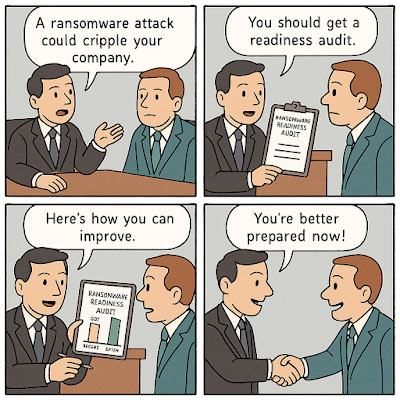How to Sell Ransomware Readiness Audits to Regulated Enterprises
Ransomware attacks are no longer hypothetical—they’re inevitable, especially for regulated enterprises in finance, healthcare, and energy sectors.
Yet many of these organizations still rely on outdated backups or passive endpoint tools, leaving gaps that threat actors exploit.
That’s where ransomware readiness audits come in—holistic assessments that evaluate an enterprise’s preparedness to detect, contain, and recover from ransomware attacks.
But selling these audits requires more than fear—you need compliance alignment, executive buy-in, and quantifiable outcomes.
📌 Table of Contents
- What Is a Ransomware Readiness Audit?
- Why Regulated Enterprises Need It
- How to Position the Audit for Compliance
- Sales Strategies That Work
- Conclusion
🧪 What Is a Ransomware Readiness Audit?
This is a formal process that evaluates an organization’s ransomware prevention, detection, and response capabilities.
It typically includes:
Asset and data classification
Backup frequency and encryption practices
Patch hygiene and EDR effectiveness
Simulated breach exercises (tabletop or live red team)
Incident response and business continuity testing
The final report highlights risk exposure, regulatory gaps, and remediation steps.
🔒 Why Regulated Enterprises Need It
Industries like banking, healthcare, and manufacturing face sector-specific rules:
HIPAA’s Security Rule requires breach risk analysis
GLBA mandates incident response protocols
PCI DSS 4.0 adds ransomware protections to cardholder data
Failure to prepare means downtime, fines, and lost trust.
Ransomware audits help clients proactively prove readiness to regulators and insurance underwriters.
📋 How to Position the Audit for Compliance
Make the audit feel like an asset—not an expense—by mapping it to frameworks:
NIST CSF and SP 800-53
ISO/IEC 27001 Annex A
CMMC Level 2 for DoD contractors
Highlight how audit reports support:
Board-level security reviews
3rd-party risk assessments
Cyber insurance applications
💼 Sales Strategies That Work
✔️ Offer a breach cost simulation using MITRE ATT&CK scenarios
✔️ Bundle audits with business continuity (BC/DR) planning
✔️ Use ransomware news headlines as executive hooks
✔️ Provide risk scoring dashboards with before/after visuals
✔️ Speak to CISOs in regulatory terms and CFOs in ROI language
Bonus Tip: Offer a “clean bill of health” certificate post-audit—it becomes a selling point for your client.
💡 Conclusion
Ransomware readiness audits are no longer optional—they're an essential part of a regulated enterprise’s digital survival plan.
By positioning audits as compliance tools with measurable business value, you can close deals faster and help your clients stay one step ahead of cyber threats.
🔗 Related Resources
Keywords: ransomware readiness audit, KYC cybersecurity, regulated enterprise IT, cyber compliance strategy, risk assessment for ransomware

